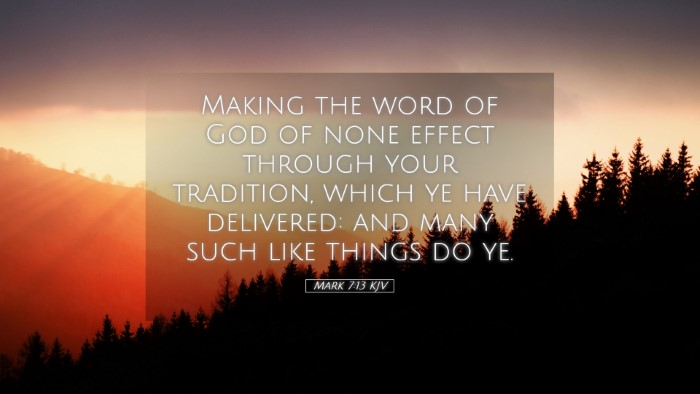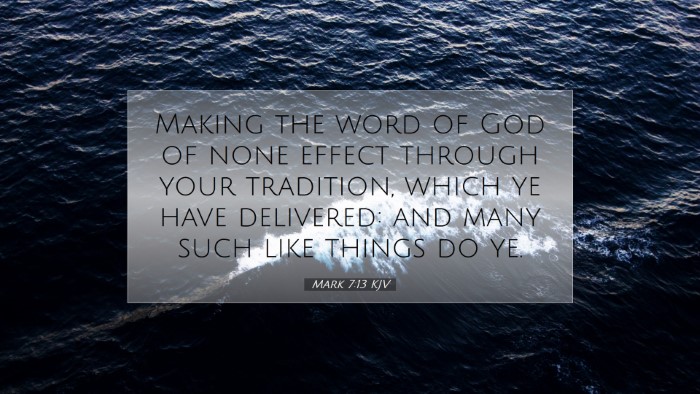Commentary on Mark 7:13
Verse: "Making the word of God of none effect through your tradition, which ye have delivered: and many such like things do ye."
Introduction
The verse Mark 7:13 highlights the tension between human traditions and divine commandments. In this verse, Jesus confronts the Pharisees and scribes who, by their traditions, have rendered God's word ineffective. This commentary synthesizes insights from various public domain sources, including Matthew Henry, Albert Barnes, and Adam Clarke, providing a comprehensive understanding suitable for pastors, students, and theologians.
Contextual Background
This verse is situated in a passage where Jesus addresses the criticisms of the Pharisees concerning his disciples' failure to adhere to traditional washing rituals. The clash between Jesus and the religious leaders underscores a recurring theme in the Gospels: the critique of man-made rules that overshadow divine commands.
Exegesis
According to Matthew Henry, this verse exposes the hypocrisy of the religious leaders, who prioritize human traditions over the teachings of Scripture. Henry points out that this critique serves to remind believers that adherence to tradition can lead to a neglect of the fundamental truths of faith.
Albert Barnes elaborates on the phrase "making the word of God of none effect," explaining that traditions can obscure and nullify the authority of Scripture. He suggests that many of the rituals imposed by religious leaders not only distract from true worship but also distort the understanding of God's intention.
Spiritual Implications
Adam Clarke emphasizes the spiritual danger of placing tradition above God's commandments. He notes that when human regulations take precedence, spiritual life stagnates, and the true essence of faith is compromised. Clarke urges believers to examine their practices critically, ensuring they support rather than undermine the teachings of Christ.
Furthermore, this verse invites reflection on the modern-day church's practices. Are church traditions enhancing our understanding of God’s word, or are they becoming stumbling blocks that obscure the gospel's message?
Application for Today
In light of Mark 7:13, it is vital for pastors and church leaders to evaluate their traditions and practices. Matthew Henry advises that traditions must be rooted in Scripture; otherwise, they risk leading congregations away from authentic faith.
- Challenge to Examine Traditions: Church leaders are encouraged to assess if their practices align with biblical teachings or if they merely serve historical preferences.
- Promoting Scriptural Authority: Pastors should prioritize preaching the Word of God, ensuring it remains central to worship and instruction.
- Encouragement of Spiritual Discernment: Congregants are urged to develop a discerning spirit, actively engaging with Scripture to differentiate between man-made tradition and divine instruction.
Conclusion
Mark 7:13 serves as a poignant reminder of the dangers of allowing human tradition to overshadow the authority of Scripture. The insights from Matthew Henry, Albert Barnes, and Adam Clarke collectively urge the faithful to guard against practices that might compromise the purity of God’s word. As the church moves forward, a commitment to scriptural fidelity and the rejection of superficial traditions will allow for a deeper and more authentic relationship with God.


